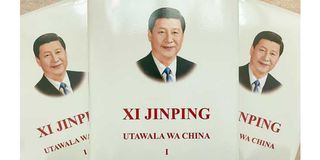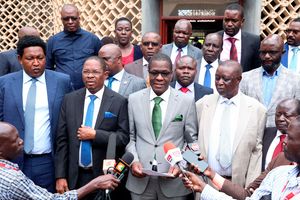Chinese leader’s Kiswahili book amplifies diplomacy

The cover of Xi Jinping’s ‘Utawala wa China’.
The University of Nairobi’s Chandaria Hall was filled to capacity during the launch of Kiswahili edition of Xi Jinping: Governance of China (Volume I).
The book, written by Chinese President, chronicles China’s development path; elucidating the philosophical underpinnings of its political and socioeconomic transformation.
Utawala wa China is a great addition to Beijing’s public diplomacy toolbox to enhance its global visibility and understanding by foreign publics. Translating the book into Kiswahili promotes wider access as the language is spoken by over 200 million people, mostly in East Africa.
Speaking to Africans in an African language is a great way to foster intercultural amity and demonstrates China’s interest in promoting other cultures in the Global South.
At the height of the Cold War, people were concerned with only three countries: Theirs, the United States and the Union of Soviet Socialist Republics. Similarly, after 1991, it was fashionable to talk about a unipolar world with the US the superpower.
Then came the rise of China, which heralded the most dramatic socioeconomic and political phenomenon at the turn of the century.
China blazed a new path of comprehensive societal transformation, lifting over 800 million people out of poverty in just three decades. It is impossible to discuss global affairs without mentioning China. A new world order is emerging with multiple centres of power and an implosion of influential regional state actors.
As Beijing chalked a new path to economic superstardom, it sought to tug along other developing countries, rolling out programmes like the Belt and Road Initiative and safeguarding their interests in multilateral platforms such as the United Nations.
President Xi’s book lays out the fundamental principles, ethos, frameworks and aspirations that have driven China’s development. It is an important book that brings the reader into the thinking of its policy-making and strategies for global integration.
Growth miracle
Observers around the world have been dazzled by China’s growth miracle; it has, indeed, been quite successful at finding solutions to the most challenging of development problems. But the discourse is often based on the outcomes of China’s development stamina.
One gets to appreciate the building blocks of China’s enviable narrative. Topics such as rule of law, people-centred policy-making, meritocracy, national brand loyalty and collective will to overcome societal challenges are well captured.
Utawala wa China was jointly published by Foreign Language Press of China and the Kenya Literature Bureau. It opens a new front in cultural exchanges between China and Kenya.
Other initiatives and programmes such as the Confucius Institutes, media exchanges and joint themed events between Kenya and China add the glue to the deepening people-to-people exchanges between the countries.
It provides important benchmarks and learning points which can inspire leaders and citizens of developing countries to muster own paths of socioeconomic transformation through effective globalisation and true multilateralism.
It should guide new diplomatic and governance discourse between China and other Kiswahili-speaking African countries.
Dr Cavince, PhD, is a scholar of international relations with a focus on China-Africa development cooperation. @Cavinceworld





